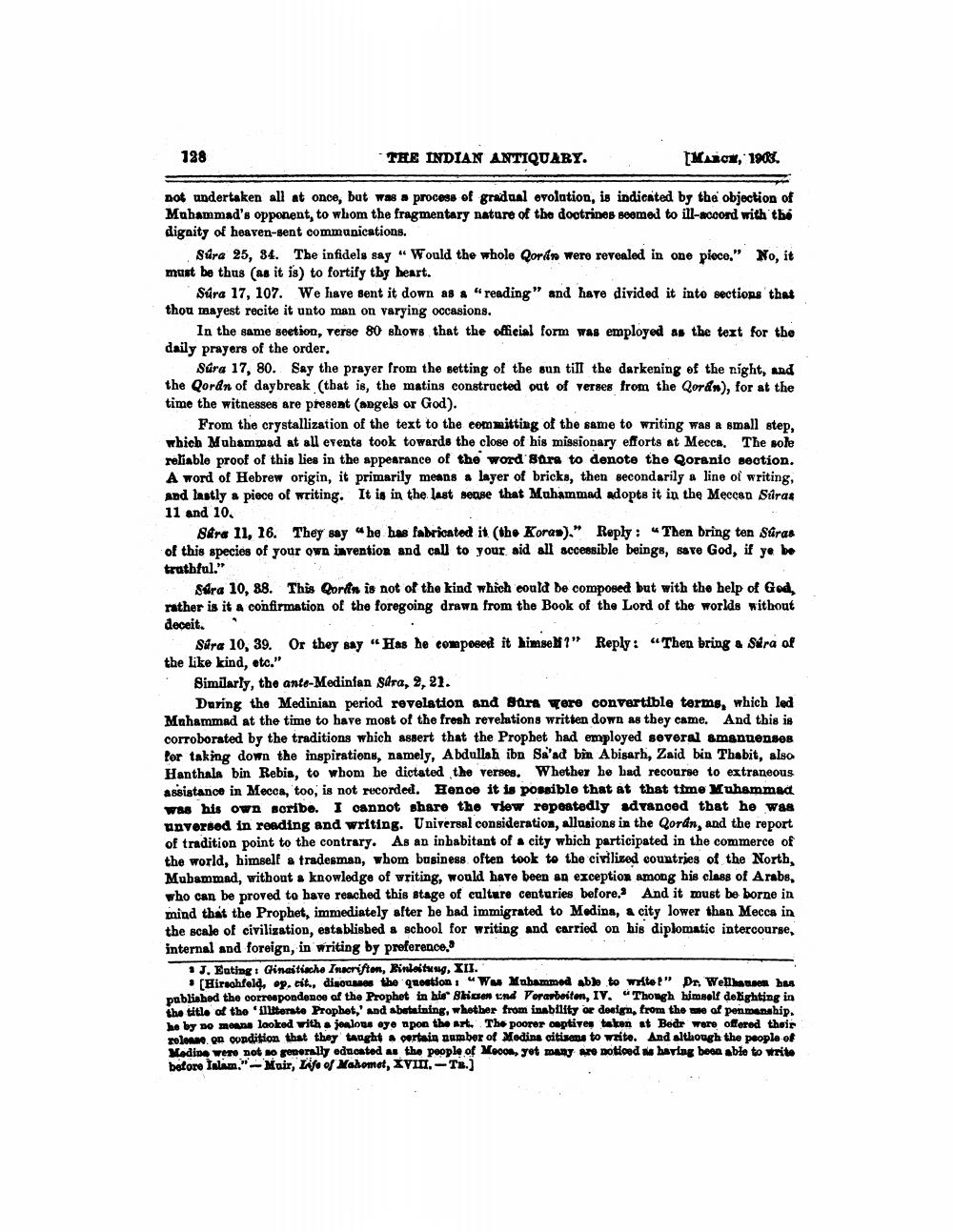________________
128
THE INDIAN ANTIQUARY.
MAZU, 1905
not undertaken all at once, but was a process of gradual evolution, is indicated by the objection of Muhammad's opponent, to whom the fragmentary nature of the doctrines seemed to ill-accord with the digaity of heaven-sent communications.
Sara 25. 84. The infidels say "Would the whole Qorin were revealed in one piece," No, it must be thus (as it is) to fortify thy heart.
Súra 17, 107. We have sent it down as a "reading" and have divided it into sections that thou mayest recite it unto man on varying occasions.
In the same seetion, verse 80 shows that the official form was employed as the text for the daily prayers of the order.
Súra 17, 80. Say the prayer from the setting of the sun till the darkening of the night, and the Qoran of daybreak (that is, the matins constructed out of verses from the Qorán), for at the time the witnesses are present (angels or God).
From the crystallization of the text to the committing of the same to writing was a small step, which Muhammad at all events took towards the close of his missionary efforts at Mecca. The sole reliable proof of this lies in the appearance of the word shira to denote the Qoranic section. A word of Hebrew origin, it primarily means a layer of bricks, then secondarily a line of writing, and lastly a piece of writing. It is in the last sense that Muhammad adopts it in the Meccan Siras 11 and 10.
Sara II, 16. They say he has fabricated in the Koran)." Reply: "Then bring ten Saras of this species of your own invention and call to your aid all accessible beings, save God, if ye be truthful."
Sdra 10, 88. This Cority is not of the kind which could be composed but with the help of God, rather is it a confirmation of the foregoing drawn from the Book of the Lord of the worlds without deceit. -
Sára 10, 39. Or they say "Has he composed it himsel?" Reply: “Then bring a Sára of the like kind, etc."
Similarly, the anto-Medinian Sdra, 2, 21.
During the Medinian period revelation and Sora were convertible terms, which led Muhammad at the time to have most of the fresh revelations written down as they came. And this is corroborated by the traditions which assert that the Prophet had employed several amanuenses Por taking down the inspirations, namely, Abdullah ibn Sa'ad bin Abisarh, Zaid bin Thabit, also Hanthala bin Rebia, to whom he dictated the verses. Whether he had recourse to extraneous assistance in Mecca, too, is not recorded. Hence it is possible that at that time Muhammad was his own soribo. I cannot share the view repeatedly advanced that he was unvorsod in reading and writing. Universal consideration, allusions in the Qorán, and the report of tradition point to the contrary. As an inhabitant of a city which participated in the commerce of the world, himself a tradesman, whom business often took to the civilized countries of the North, Mubammad, without a knowledge of writing, would have been an exception among his class of Arabs, who can be proved to have reached this stage of culture centuries before. And it must be borne in mind that the Prophet, immediately after he had immigrated to Medina, a city lower than Mecca in the scale of civilization, established a school for writing and carried on his diplomatic intercourse, internal and foreign, in writing by preference,
1 J. Eating Chinastische Inscripton, Irlaltung, XII.
• Hirschfeld, op. cit., discusses the question: "We Muhammed able to write?" Dr. Wellhame has published the correspondence of the Prophet in his shigen und Verarbeiten, IV. "Though himself delighting in the title of the utterate Prophet,' and abstaining, whether from inability or design, from the sue of penmanship. he by no meana laoked with jealous eye apon the art. The poorer captives taken at Bedr were offered their tolona, on ondition that they taught « certain number of Medina citiseme to write. And although the people of Medine were not so generally educated as the people of Mooon, yet many are noticed as having been able to write betore Islam." -- Muir, Life of Mahomet, XVIII.-TB.)




